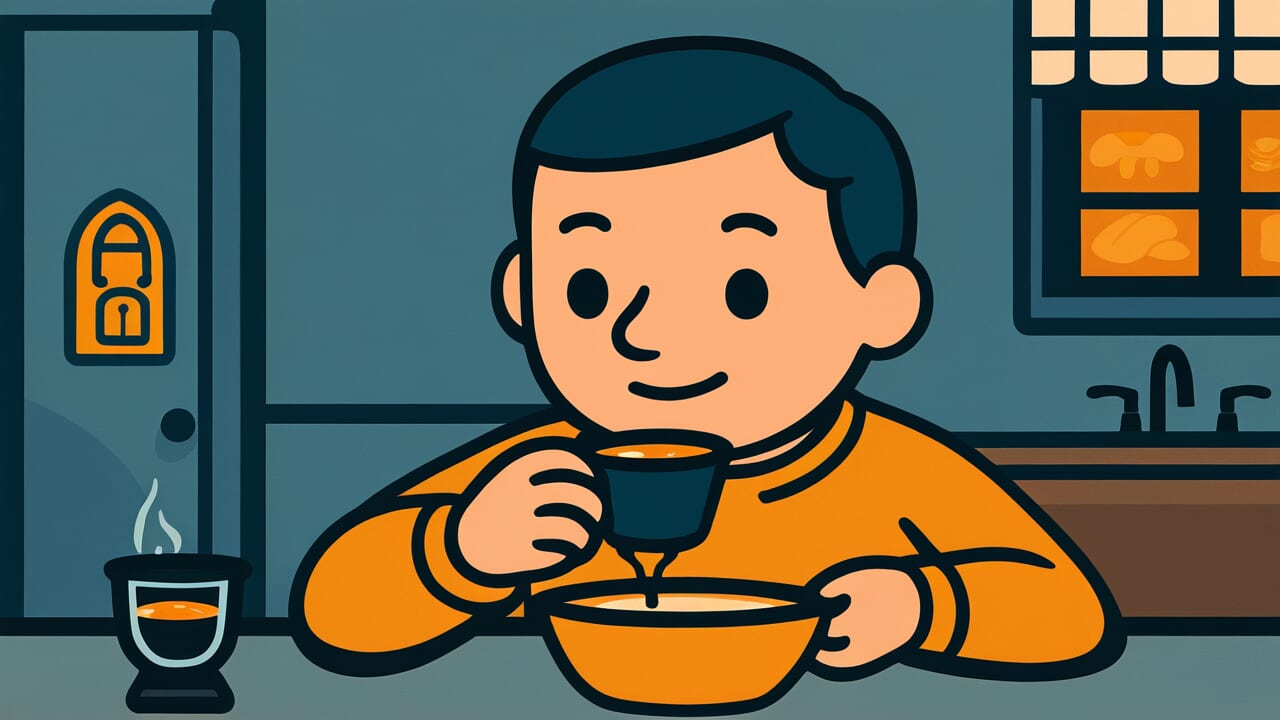How to Read “Having food but making gun soup”
Kuimono no aru noni teppōjiru
Meaning of “Having food but making gun soup”
This proverb warns against the foolishness of wanting something else when you already have enough. You have regular food right in front of you, but you still seek hard-to-get gun soup.
It criticizes people who chase after other things without noticing that what they have should already satisfy them.
People use this proverb when someone overlooks nearby solutions and only seeks difficult, distant options. For example, when someone wants expensive new tools even though their current tools work perfectly fine.
The reason for using this proverb is to help others recognize the value of what they already have. Even today, people tend to lose sight of what they possess and chase only what they lack.
This proverb teaches us the importance of noticing the happiness and solutions right at our feet.
Origin and Etymology
No clear written records explain the origin of this proverb. However, we can make interesting observations from how the phrase is constructed.
“Teppō-jiru” means soup made with game meat. During the Edo period, hunters called soup made with boar or deer meat shot with guns by this name.
Game meat was precious and considered a special treat for important occasions.
The background of this proverb likely reflects the food situation of that time. Regular meals centered on rice and vegetables, which provided sufficient nutrition.
However, people sometimes couldn’t feel satisfied with ordinary food in front of them. They craved rare game meat soup instead.
The phrase “having food” is crucial. It means “in a situation where food already exists,” showing a state that should be satisfying.
Yet people still sought hard-to-get gun soup. Our ancestors sharply noticed this contradiction in behavior.
Through the contrast between everyday food and special delicacies, this proverb expresses human greed. It captures the psychology of being unable to feel satisfied with what we have.
Usage Examples
- You can cook perfectly well with ingredients at home, but going out to buy luxury ingredients is like having food but making gun soup
- Your current computer handles your work fine, but wanting the latest model is exactly like having food but making gun soup
Universal Wisdom
This proverb has been passed down through generations because it brilliantly captures an essential human trait. That trait is our fundamental desire to “never feel satisfied with what we have.”
Why do people seek something else when they already have enough? Several factors intertwine in this psychology.
One is the grass-is-greener mentality. Things we cannot obtain seem more attractive, and we become blind to the value of what we possess.
Another factor is the flip side of human ambition and curiosity. The desire for better things has supported human progress throughout history.
However, this same impulse sometimes becomes blind desire. It makes us lose sight of the abundance at our feet.
Our ancestors deeply understood this human nature. That’s why they used the concrete contrast between everyday food and special gun soup to express this truth.
Feeling unfulfilled despite being fulfilled—this contradictory psychology might be the essence of being human.
This proverb doesn’t deny desire. Instead, it gently teaches us the importance of first recognizing the value of what we already have.
When AI Hears This
You have reliable food right in front of you, yet you shoulder a gun and go hunting. When you consider this action numerically, its irrationality stands out clearly.
If the value of food at hand is 100, the hunting success rate with period technology was only about 30 percent. The expected value is just 30.
Yet people abandon 100 to chase 30.
The core of this judgment error lies in how human brains use different circuits to evaluate “certainty” versus “possibility.” Research by behavioral economist Kahneman and others shows something fascinating.
People underestimate the value of certain gains by about 30 percent. Conversely, they hold expectations 1.5 to 2 times higher for uncertain benefits.
The moment the brain judges that food is “already obtained,” its psychological value decreases. Meanwhile, prey to be shot with a gun grows larger and more delicious in imagination.
Even more interesting is how owning the tool itself creates bias. Since you have a gun, it feels wasteful not to use it.
This “endowment effect” distorts judgment. People who can’t cut investment losses, people who miss job opportunities—they all fall into the same trap.
This proverb sharply points out human nature: undervaluing certain value while betting on uncertain expectations.
Lessons for Today
This proverb teaches modern people the value of “knowing what is enough.” In today’s information-flooded society, we constantly see new things and what others have.
We easily lose sight of the value of what we already possess.
What matters is pausing before seeking something. Is it truly necessary? Isn’t what you have now sufficient?
Think calmly. In most cases, we already have what we need.
This isn’t just about material things. In relationships and work too, seeds of happiness and growth hide within your current environment.
Rather than chasing distant ideals, notice the possibilities at your feet. This makes life much richer.
Of course, having ambition is wonderful. But first, appreciate what you have now and fully utilize its value.
Starting there makes your choices wiser. A heart that cherishes what exists in this moment is the first step toward true abundance.



Comments